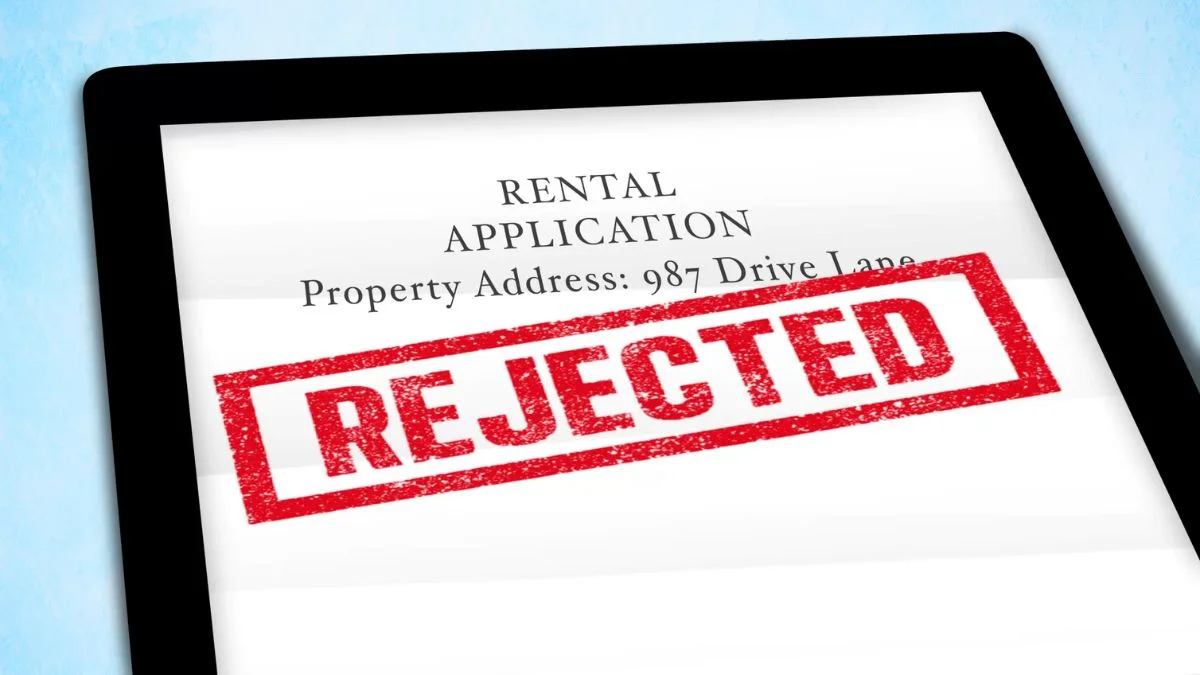Finding the right tenant isn’t always easy. As a landlord, you need someone who will pay rent on time and care for your property. But sometimes, an applicant just doesn’t seem like a good fit. Can you deny them and do it legally?
This is a question many landlords face. Denying a rental application must be done carefully. One wrong step can lead to claims of discrimination and legal trouble. In this guide, we’ll cover 10 valid reasons to deny a rental application to help you learn how to screen applicants fairly and avoid any violations of Fair Housing laws.

Can a Landlord Deny a Rental Application?
Yes, a landlord can deny a rental application - as long as the reasons are legal reasons to deny tenant and consistent across all prospective tenants. A landlord must not discriminate based on protected classes. But there are many legitimate factors, like insufficient income or poor credit, which qualify as reasons for denying rental application when used uniformly. A denial based on sound policies is not only lawful but necessary to protect your property and bottom line.
To summarize, a denial based on clear, documented policies is not only lawful but also protects your property and bottom line. If you’re unsure how long screening might take, here’s a resource on how long tenant screening takes to help plan your process.

10 Valid and Legal Reasons to Deny a Rental Application
As a landlord, knowing the valid and legal reasons to deny a rental application is essential. By understanding and applying objective, consistent criteria, you protect yourself legally and maintain a fair rental process. Here are 10 valid reasons to deny rental applications you can rely on when evaluating it:
1. Insufficient Income
Income is one of the first things landlords review because it reflects a tenant’s ability to pay rent on time. When an applicant earns too little, it increases the risk of late or missed payments, which is why this becomes a common and legal reason to deny a rental application.
Most landlords rely on a clear rule to keep the process consistent and fair. A common standard is the “3x rent rule”, which means the tenant’s gross monthly income should be at least three times the monthly rent. For example, if the rent is $1,200 per month, the applicant would need to earn at least $3,600 per month to qualify. If their income falls below this threshold, you have a legitimate reason to deny the application under fair housing laws.
2. Poor Credit History
A tenant’s credit history gives landlords a clear picture of how they manage their finances. Poor credit can indicate a higher risk of late or missed rent payments, which is why it often becomes a legal and valid reason to deny a rental application.

Typically, a poor credit score falls below 600, and a report may also show late payments, high credit utilization, or outstanding debts. These signs suggest that the applicant might have difficulty meeting monthly rent obligations.
To stay consistent and fair, landlords should set a clear credit benchmark for approval. For example, you might require a minimum score of 620 to qualify. If an applicant’s score falls below this threshold, you can deny the application based on credit history without violating fair housing laws.
3. Previous Evictions or Unpaid Rent
A history of prior evictions or unpaid rent is one of the clearest warning signs for landlords. These records suggest that the applicant has struggled to meet rental obligations in the past, which can create significant risks for any new tenancy.
From a landlord’s perspective, these risks include:
- Financial loss from unpaid rent or extended vacancy periods if the tenant defaults.
- Legal costs related to eviction proceedings, which can be expensive and time‑consuming.
- Property damage if the tenant leaves abruptly or neglects the unit during the eviction process.
- Operational disruption, since dealing with evictions often delays finding a stable tenant.
Because of these potential risks, many landlords choose to deny applicants with recent evictions or outstanding rental debts. To remain compliant with fair housing laws, it’s important to follow a clear and consistent screening rule - for example, denying applications from tenants who have been evicted within the last seven years or who currently owe unpaid rent.
When communicating the denial, keep it professional and concise. A simple notice such as, “Your rental application was not approved due to your rental history, which includes previous eviction(s) or unpaid rent,” is enough. Landlords should avoid providing unnecessary details or personal opinions, as clear and neutral language helps protect you legally.
4. Problematic Criminal Background
A criminal history can signal potential risk to both the property and other tenants. Serious offenses like drug trafficking, burglary, or violent crimes raise clear safety concerns. For landlords, the risks include property damage, liability if another tenant is harmed, and potential reputational issues if neighbors feel unsafe.
For example, legal reasons to deny rental applications in California allow landlords to consider only relevant criminal convictions—those that directly affect safety or property. State law also imposes strict timing and usage restrictions on background checks, meaning you can’t automatically reject applicants for old or unrelated offenses.
5. Incomplete or Inaccurate Application
The rental application is your primary tool for evaluating tenants. If an applicant fails to provide all required information or submits false details - like a fabricated employment history - that’s a major red flag. Incomplete or inaccurate applications may indicate carelessness or dishonesty, which could lead to future lease violations.
Legally, you can deny the application if mandatory fields are missing or if you confirm that the information is false. The key is to document the reason clearly and apply the same standard to every applicant.
6. Unsatisfactory References
References provide a broader picture of a tenant’s reliability and character. While previous landlords are the most common source, property managers and even current or past employers can also offer valuable insights. These references can confirm whether an applicant consistently pays rent on time, takes care of the property, and maintains professional or respectful behavior.
During the tenant screening process, landlords often perform a reference check by contacting these individuals to verify the applicant’s rental history, employment stability, and general reliability. Asking the right questions - such as those outlined in this guide to landlord reference questions - helps you uncover patterns like frequent late payments, property damage, or disruptive behavior.
If the feedback from these references indicates repeated issues, it’s a valid reason to deny the rental application. To remain fair and compliant, document the negative feedback (e.g “multiple late payments and noise complaints”) and communicate the denial professionally, without personal judgments or unnecessary details.
7. Exceeding Occupancy Limits
Local housing codes and building regulations often impose strict occupancy limits based on the unit’s size or number of bedrooms. Allowing too many people in one unit not only violates the law but also creates risks like property wear, fire hazards, and complaints from other tenants.
You are allowed to deny applications that exceed these limits, and doing so is not considered discrimination as long as you follow the official occupancy guidelines. For example, if your local rule allows two persons per bedroom, an application for five occupants in a two‑bedroom unit can be denied legally.
8. Non‑Compliance with Rental Terms
Every property has rules designed to maintain order and protect the property, such as “no pets,” “no smoking,” or parking restrictions. When an applicant openly states they cannot or will not follow these rules, they are signaling potential future lease violations.
You can deny the application legally if the non‑compliance is tied to a lawful lease condition and you apply this rule to all tenants. Communicate the decision briefly, for example: “Your application was not approved because it does not meet the property’s rental terms (no‑pet policy).”
9. History of Property Damage or Disturbance
An applicant with a track record of damaging rental units or causing disturbances is a clear liability for landlords. Past behavior often predicts future issues - ranging from costly repairs to neighbor disputes and even potential eviction.
Before denying, ensure that the information comes from verifiable sources, such as prior landlords or inspection records. Then issue a professional denial notice referencing “rental history concerns, including prior property damage or disturbances,” without adding personal commentary.
10. Unverifiable or Insufficient Proof of Income
Even if an applicant claims a high income, landlords need documentation, such as pay stubs, bank statements, or an employer letter to confirm it. Without verifiable proof, you cannot accurately determine if the tenant can meet monthly rent obligations. This uncertainty increases the risk of late payments, missed rent, or even costly eviction proceedings for the landlord.
Landlords typically verify income through employment checks, which may include calling the employer or reviewing official documents. You can read more about this process in our guide to verifying employment. A neutral denial message might say: “Your application was not approved because your income could not be verified according to our rental requirements.”
What Are Invalid or Discriminatory Reasons for Denial?
Denying an application based on the following criteria is illegal under federal and potentially state and local Fair Housing laws:
1. Race, Color, Religion, Sex, or National Origin
Can a landlord refuse to rent to someone because of their skin color, country of origin, or religion? Absolutely not. Landlords cannot refuse to rent to someone based on race, religion, national origin, or other protected characteristics under the Fair Housing Act (part of Title VIII of the Civil Rights Act of 1968).
This federal law makes it illegal to deny a rental application because of a person’s skin color, country of origin, religion, sex, familial status, or disability. Violating this law can lead to serious penalties and legal action.
2. Familial Status (e.g., renting to single parents or families)
Under the Fair Housing Act (42 U.S.C. § 3604), landlords cannot discriminate against applicants based on familial status. This protection applies to:
- Families with children under 18
- Pregnant women
- Individuals in the process of securing legal custody of a child (e.g., adoption or foster care)
Denying a rental application solely because the applicant has children is unlawful. For example, a landlord cannot deny a single mother’s application just because she has kids, even if the landlord prefers “adult‑only” tenants.
The only narrow exceptions involve qualified senior housing communities (55+ or 62+), which are explicitly permitted under the Housing for Older Persons Act (HOPA, 42 U.S.C. § 3607). Outside of these exceptions, rejecting tenants because of children or family size violates federal fair housing law and can lead to penalties or civil lawsuits.
3. Disability (mental or physical)
The law requires you to make reasonable accommodations for people with disabilities. Denying an applicant solely because they have a physical or mental disability is illegal.
4. Sexual Orientation or Gender Identity (varies by state)
The federal Fair Housing Act does not directly list sexual orientation or gender identity as protected classes. However, since the Bostock v. Clayton County (2020) Supreme Court decision, HUD treats discrimination against LGBTQ+ applicants as sex discrimination under 42 U.S.C. § 3604.
In addition, many states and cities have their own fair housing laws that explicitly protect LGBTQ+ individuals. For example:
- California Fair Employment and Housing Act (FEHA, Cal. Gov. Code § 12955) prohibits discrimination based on sexual orientation and gender identity.
- New York Human Rights Law (N.Y. Exec. Law § 296) also provides explicit protection.
5. Immigration Status (in some jurisdictions)
In some jurisdictions, denying a tenant based on their immigration status is illegal. This can vary depending on local laws.
For instance, if a landlord in New York City receives an application from a family whose parents are undocumented but whose children are citizens of the United States, and the landlord rejects the application on the grounds that the parents are undocumented, it would be in violation of the New York City Human Rights Law (Title 8, Administrative Code), which forbids discrimination on the basis of citizenship status or alienage.
How to Deny a Rental Application Legally and Respectfully
Denying a rental application is not just a legal matter; it's a professional one. You must do it the right way:

Set Tenant Screening Criteria in Advance
Before you start taking applications, write down a list of specific, quantifiable criteria. This includes requirements for credit scores, income multiples, eviction history, income documentation, occupancy limits, pet policies, etc. Consistent criteria let you deny applications legally and transparently.
Apply Screening Criteria Consistently
Apply the same standards to every applicant. If someone falls short of your legal reasons to deny tenant, you may deny. But applying different pressure to one applicant and not another can lead to claims of discrimination.
Provide Written Denial Notice (Adverse Action Letter)
If you deny an application based on information from a credit report or tenant screening report, you must send them an "Adverse Action Letter." This letter should state the reason for the denial and provide contact information for the company that provided the report. This is required by the Fair Credit Reporting Act (FCRA).
Keep Documentation for Legal Protection
Keep copies of applications, income documents, credit and criminal checks, and your denial criteria. Document your decision-making to defend against claims. Also, check local rules like special notice requirements, so you have full legal compliance.
Also read: How long does tenant screening take to better manage your process?
State‑Specific Notes Landlords Should Know
Housing laws can vary by state and even city. It’s vital to understand the laws where your property is located.
1. California: Stringent Rules on Criminal History Use
California restricts the use of arrest records and older convictions in tenant screening. Landlords must follow rules on timing of criminal history inquiries and what convictions may be considered.
Yet you can still deny someone for criminal behavior tied to property or safety concerns, as long as you act within state law. These are legal reasons to deny rental application in California.
2. Texas: Broad Landlord Rights but Still Must Follow FHA
Texas landlords have latitude to enforce strong screening criteria, such as requiring higher income multiples or charging extra deposits. But they still must follow the Federal Fair Housing Act (FHA). That means they cannot use income rules to indirectly discriminate, or apply them unevenly.
For example: A landlord can deny an applicant earning less than 3× the rent. But if they only enforce this rule against families with children, it would violate the FHA.
3. Montana: Special Notice Requirements in Denial
Montana requires landlords to provide written notice to denied applicants and may have local guidance on timing. Be sure to check state-specific tenant screening laws before denying.
For example: If a landlord denies an application due to poor credit, they should provide written notice and keep records to comply with Montana’s landlord‑tenant law (Mont. Code Ann. § 70‑24‑303).
Conclusion
Making the decision to deny a rental application is an important part of property management. By relying on valid reasons to deny rental application and adhering to legal principles, you can protect your property and avoid unnecessary legal trouble.
To simplify this process and ensure every decision is backed by accurate data, consider using LeaseRunner. Our tenant screening services provide instant credit checks, background reports, and rental history verification, helping landlords apply consistent criteria and reduce the risk of costly mistakes.
By combining clear policies with reliable screening tools, you can confidently select the right tenants and maintain a safe, profitable rental property.
FAQs
1. Does a landlord have to give a reason for denial?
Yes, especially if you used a credit or screening report, federal law requires an Adverse Action Letter. Even if not required by your locality, providing a written explanation builds trust and avoids misunderstandings
2. Can a landlord deny based on bad credit alone?
Yes. If poor credit history falls below your set threshold, that counts as a reasons for rental application denial. You must apply the same credit standard to all applicants. Avoid subjective judgments like “seems unreliable.”
3. Is denying someone with a pet considered discrimination?
Not usually, unless you have a no‑pet policy that applies to all tenants consistently. However, there's a crucial exception: if the tenant has a service or emotional support animal, you must make reasonable accommodations for them under the Fair Housing Act.
4. Can I deny an application if they apply with roommates?
Only if the group fails to meet your criteria as set in advance. For instance, if combined income or credit fails your screening rules, you can deny. But you cannot deny solely because someone plans to live with roommates, unless occupancy limits or policies are legitimately violated.







